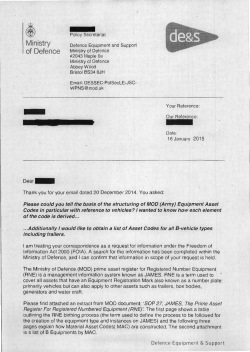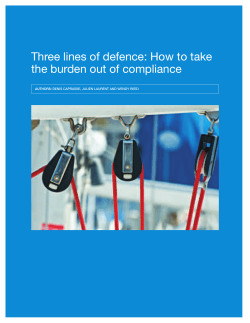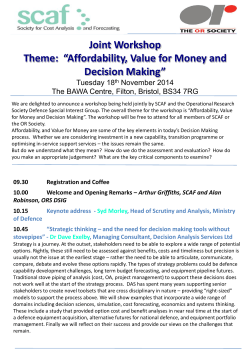
Strategic Defence and Security Review 2015: Defence
Policy Briefing 9/2014 Strategic Defence and Security Review 2015: Defence must close the civil-military gap Professor Timothy Edmunds, University of Bristol Professor Andrew Dorman, King’s College London Professor David Dunn, University of Birmingham About the research Policy implications The armed forces are dependent on the societies of which they are a part. In democracies, the military derives its purpose from acting in society’s name; whether to protect the nation from threat, or to advance its interests. • Government and the defence establishment should consider carefully how justifications for the armed forces’ role and the use of military force align with popular perceptions of legitimacy and threat. However, military-society relations in Britain are complex and changing. The UK is currently navigating a series of challenges in this area, including: how to fund and sustain the armed forces to fulfil their missions; how to recruit and retain service men and women; how to ensure an appropriate duty of care for service personnel and their families; and how to accommodate changing societal expectations in relation to social diversity and conditions of employment. These issues are often downplayed in debates on British defence and security. Even so, they are likely to significantly influence the legitimacy and sustainability of the government’s forthcoming Strategic Defence and Security Review (SDSR) of 2015. The University of Bristol’s Global Insecurities Centre recently hosted a workshop, funded by the Economic and Social Research Council, to consider these challenges. The workshop panels addressed the topics: Military and Society; Public and Military Perceptions; Society in the Military; and The Military in Society. This briefing presents the workshop’s findings. This work explores the challenges facing UK defence in preparation for a major Strategic Defence and Security Review to take place in 2015. • The 2015 Strategic Defence and Security Review should not focus on equipment and force structures over ‘softer’ issues of recruitment, retention and the duty of care for service personnel. • More attention needs to be paid to the needs of those who fall outside of formal military support networks, including families, reservists and veterans. • The armed forces have taken big strides in accommodating diversity. Yet problems of marginalisation for women in the armed forces remain, and more attention should be given to addressing issues of organisational culture and behaviour. • There is a need for a more open public debate about who the armed forces are, what they do, and how they fit into a vision of the UK’s global purpose, interests and responsibilities. PolicyBristol – influencing policy through world-class research Policy Briefing 9/2014 Key findings Further information • There is an emerging ‘civil-military gap’ in Britain, with a pronounced discrepancy between elite perceptions of the military role, which focus on expeditionary operations, and those of the general public, which continue to emphasise national defence. This one-day workshop is the third in a series of seven ESRC-funded events on Reconnecting the academic community to British defence and security policy: the 2015 Strategic Defence and Security Review (ES/ L001616/1). The workshop series brings together speakers and participants from across academia, civil society, government, the Ministry of Defence and armed forces to consider key challenges facing British defence in the run-up to the Strategic Defence and Security Review of 2015. • The gap is a reflection of disillusionment with the wars in Iraq and Afghanistan and of a more conditional and individualistic engagement with the state in British society as a whole. • While the armed forces remain popular as an institution and as individuals, the general public’s appetite to spend more on defence or to join the armed forces themselves is limited. • The military wishes to be understood on its own terms, and supported in the roles and missions in which it is engaged. Public scepticism toward recent military operations can exacerbate service personnel’s sense of alienation on their return home. • Military personnel generally appear to feel well-supported in their welfare needs. However, there are some notable blind spots in this picture, including the support provided to reservists and military veterans, as well as the continuing marginalisation of women in some quarters. LA Burke © Crown Copyright 2014 The full report on which this policy briefing is based is freely available on PolicyBristol’s website: http://tinyurl.com/q8envww For more information on the Global Insecurities Centre at the University of Bristol see: bristol.ac.uk/global-insecurities/ Contact the researchers Professor Timothy Edmunds, University of Bristol tim.edmunds@bristol.ac.uk Professor Andrew Dorman, King’s College London amdorman@btinternet.com Professor David Dunn, University of Birmingham d.h.dunn@bham.ac.uk Funded by: policy-bris@bristol.ac.uk | bristol.ac.uk/policybristol | @policybristol
© Copyright 2025





















